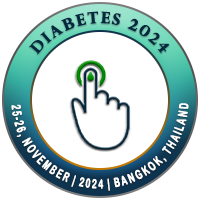
Qazi Najeeb
Government Medical College & Associated Hospital, IndiaTitle: To Evaluate the Levels of Glycated Hemoglobin, Serum Calcium, Magnesium, Phosphate, Uric Acid and Microalbuminuria in Patients with Newly Diagnosed Type 2 Diabetes Mellitus
Abstract
Background: Over the past three decades, the number of people with diabetes mellitus has more than doubled globally, making it one of the most important public health challenges to all nations. Therefore, the present study was undertaken to compare the levels of HbA1c, serum calcium, serum magnesium, serum phosphate, serum uric acid and microalbuminuria in patients with newly diagnosed type 2 diabetes mellitus with normal healthy individuals.
Methods: This is a cross sectional study and was undertaken in the Department of Biochemistry, SKIMS-MC&H, Bemina, Srinagar. Total 300 subjects included in this study were divided into 2 groups. Group I: included 150 normal healthy individuals, who were in the age group 30-80 years, of either sex. Group II: included 150 newly diagnosed patients of Type 2 diabetes mellitus in the same age group. Fasting blood samples were drawn and investigated for serum calcium, magnesium, phosphorus, uric acid, blood sugar and HbA1c. 24-hours urine was taken for estimation of microalbuminuria, and these values were compared with those of normal healthy subjects. Means ± standard deviation were calculated and student t-test was applied to find out significance level.
Results: Mean serum levels of FBS, HbA1c, calcium, magnesium, phosphate, uric acid were 89.71 ± 9.22, 4.68 ± 0.47, 9.61± 0.84, 2.23 ± 0.41, 3.45 ± 0.46, 4.21 ± 1.04 in controls (group-I) and 145.57 ± 76.61, 8.94 ± 2.38, 8.09 ± 0.18, 1.92 ± 0.27, 2.82 ± 0.68, 7.01 ± 0.27 in cases (group-II) respectively (<0.001). Microalbuminuria showed significant mean difference between cases and controls 35.01 ± 41.30 and 15.35 ± 2.60 (<0.001).
Conclusion: There is decrease in serum calcium, magnesium and phosphate levels, all these plays an important role in the regulation of glucose level in the blood. Hence oral supplementation of all these ions other than diet is recommended. Increased serum uric acid and microalbuminuria was seen with reduced glucose tolerance hence early estimation of both the parameters should be done while monitoring case of Type-2 diabetes and thus will help to decrease the incidence of renal complications.
Biography
Dr. Qazi Najeeb has done MBBS from Rajiv Gandhi University of Health & Sciences Bangalore and MD-Biochemistry from MMU Ambala, India. Presently he is working as head in the department of biochemistry Government medical College Rajouri (J&K) India. He has over 30 publications that have been cited over 100 times. He is the Life Member of Association of Medical Biochemists of India (AMBI), Association of Clinical Biochemists of India (ACBI), Indian Academy of Biomedical Sciences (IABS) and many more. His area of interest is in Non-communicable diseases & Molecular Biology.

